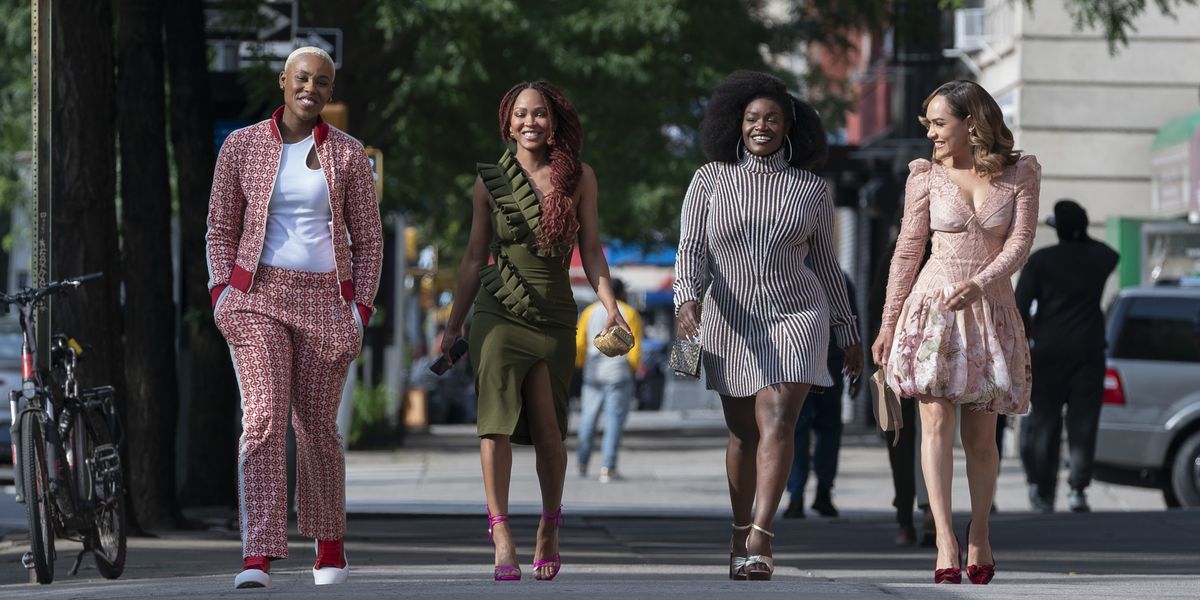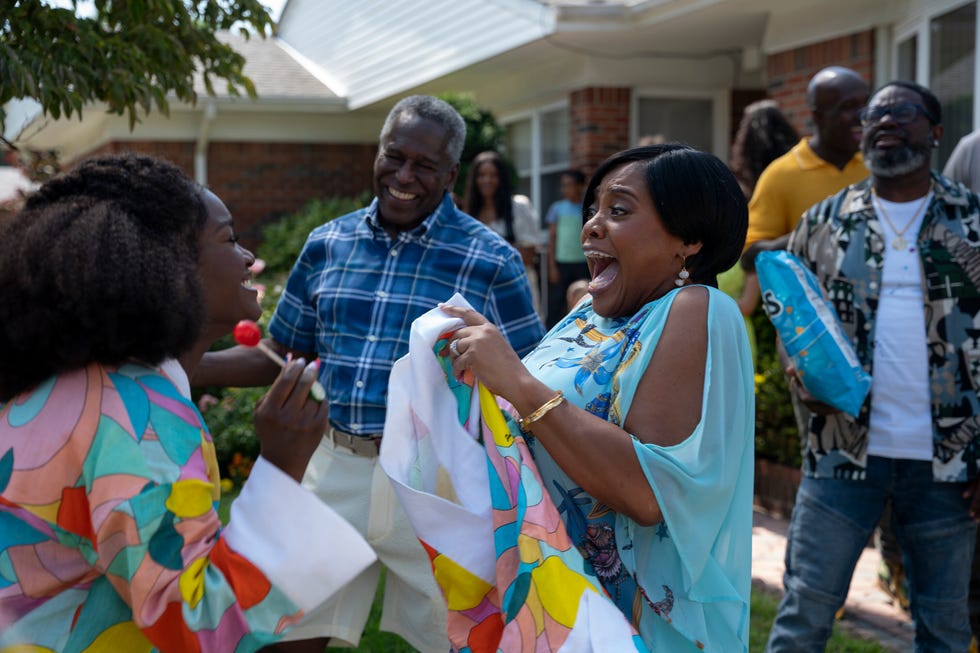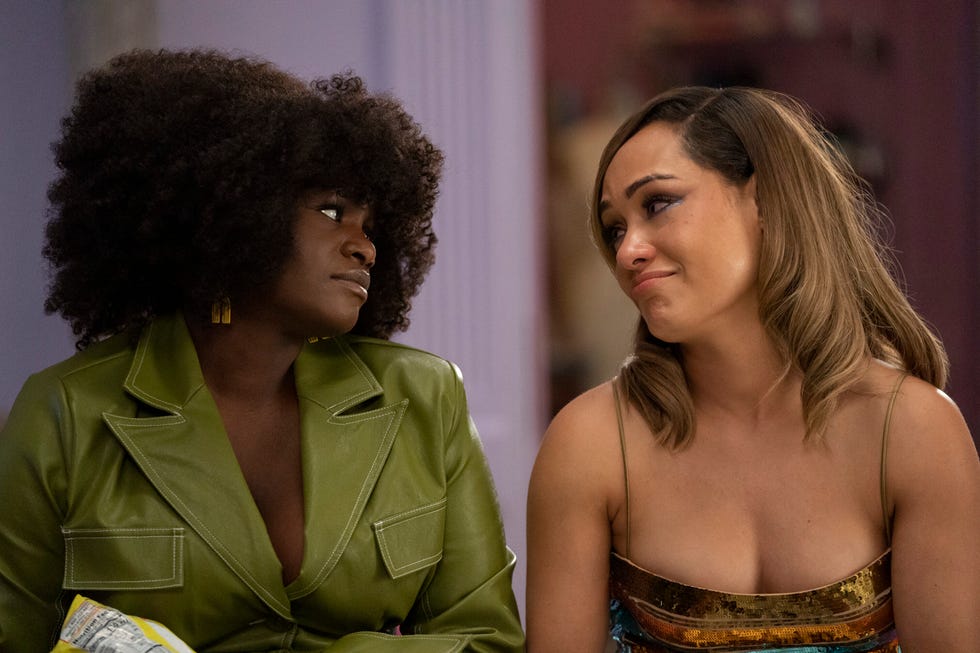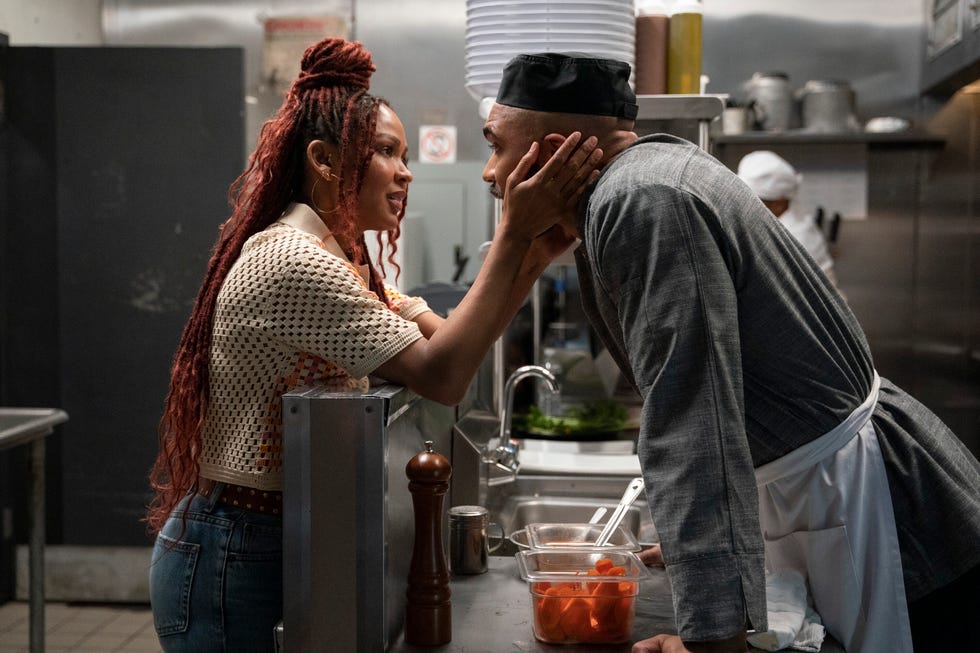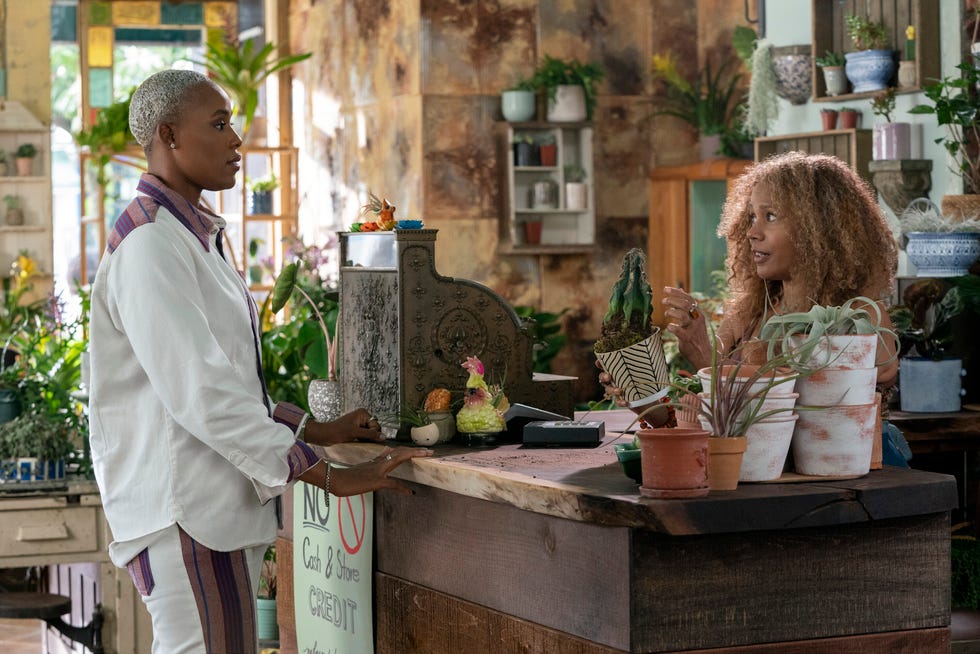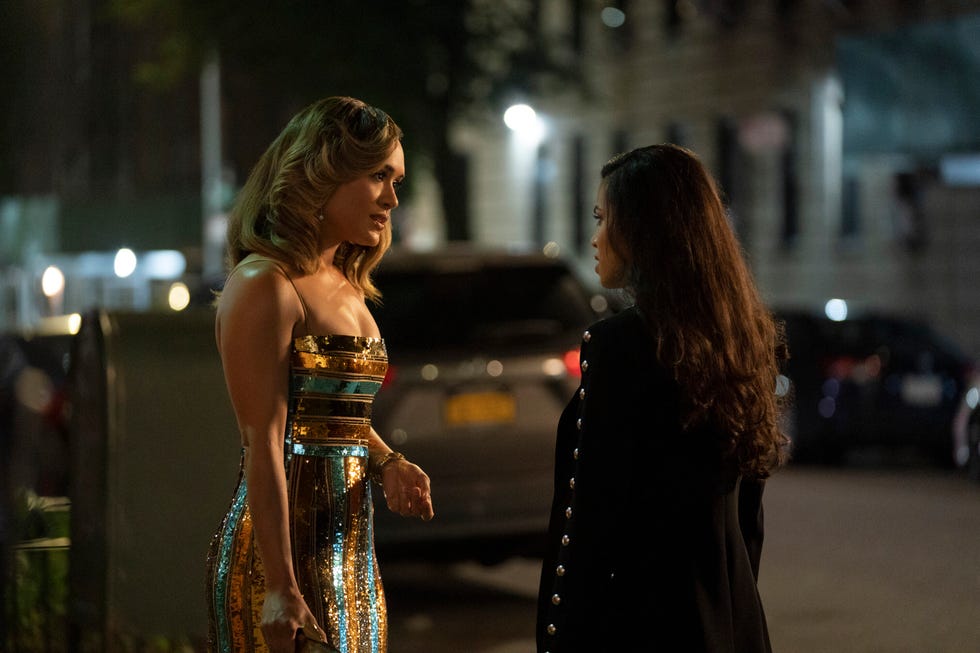This story contains spoilers for the Harlem season 2 finale.
Tracy Oliver craves stories that put women’s messiness front and center. The ones with compelling characters with big emotions who come undone, or who comfortably take up space while prioritizing their pleasure and peace, even if it rocks the boat.
Oliver, who is the series creator, executive producer, and showrunner of the popular Prime Video dramedy Harlem, knows these portrayals can be much-needed affirmations for women. Threaded throughout Oliver’s work are reminders that it’s perfectly okay to live life outside the confines of societal expectations and to still be figuring things out as you age.
“It’s important for me to show the messiness because that’s real life. We often say things that we shouldn’t say, or because of our emotions, call or text things that we shouldn’t and then immediately regret it or feel embarrassed the next day,” shares Oliver. “I can’t tell you how many times me and my girlfriends are like, I can’t believe I did that. We accept those flaws and those differences and emotional impulses that come up in each other because it’s human. That messiness never really goes away. As you age, you become smarter but you’re still vulnerable to making mistakes and getting your feelings hurt and not always acting in your best interest.”
In season 2 of Harlem, we pick back up with the quartet of 30-something best friends—played by Meagan Good (Camille), Shoniqua Shandai (Angie), Grace Byers (Quinn), and Jerrie Johnson (Tye)—as they continue exploring and building their respective versions of a joyful life. Each woman finds herself at a crossroads, confronting her desires in the present day, how it differs from the life she had envisioned for herself, and at times the contention with personal, societal, or familial benchmarks of successful adulthood. As each character traverses various highs and lows, we see them also navigate the beautiful possibility that can arise when life as you know it falls apart.
“What I’m trying to do through the show is subtly show that there is no right or wrong way to be a woman,” continues Oliver. “Any choice that you decide to make that fulfills your personal goals and your personal happiness is right for you. It doesn’t matter what society has to say ultimately.”
She’s taken a similar accepting approach to her writers rooms, choosing to “hire mostly women, mostly people of color, and create a safe space for them to speak up and feel heard and to be big and take up space,” she says. “And not have someone tell them they’re doing too much just by existing.”
Ahead of Harlem’s season 2 finale, ELLE.com connected with Oliver to discuss honoring women’s joy and pain onscreen, the famous family members who inspired a major season 2 plot twist, and the importance of showing the nuances of women in their thirties considering motherhood on TV.
One of my favorite Harlem episodes is episode 3 from this season. We get a heart-warming look at Angie spending time with her family, and the affirming foundation that helped her grow into a confident and self-assured adult. Can you talk about coming up with that episode and finding the right fit to play Angie’s mother?
There are a lot of different interpretations of the character Angie. I think she is the most confident and self-assured and the most liberated of the friend group. She’s the least likely to be caught up in what society has decided women should be and she doesn’t feel a need to make herself smaller. When I was thinking about that, I was like, that kind of woman grew up in a household that encouraged it. She didn’t grow up in a household that silenced her and that told her she wasn’t good enough.
Sherri Shepherd immediately came to mind when thinking about who embodies that vibrancy and same physicality but older. We were fortunate enough for Sherri to say yes and she totally got it. She knew Angie’s mother needed to be loving and soft, but also a tell-it-like-it-is mom who tells you directly how she feels. The environment is loving and nurturing, and Sherri really nailed it. It was also just important for us to celebrate dark skin in that episode and for none of it to feel negative. I wanted to show a Black family who looks like that and who feel like they’re worthy and that they’re beautiful and they’re proud.
It seems like many Black women viewers of the show feel protective of the character Angie, in particular, because of colorism and Hollywood’s history of treating dark-skinned Black women unkindly on screen. Is navigating those sensitives and avoiding caricatures or harmful stereotypes something you and the writers discuss and try to be extra mindful of?
It’s tricky. Angie’s the character that we spend the most time talking about colorism or navigating certain things. It’s a hard conversation because on one hand I understand where the need to portray a darker skinned Black woman in a positive light or to not be overly sexualized comes from. At the same time, I disagree with a lot of it. I don’t want to fall into the respectability politics trap where now we’re silencing someone who looks like Shoniqua or we’re saying someone who talks and acts in a larger than life manner should make herself smaller or that she shouldn’t be on the screen.
I saw a comment once that said, “Why couldn’t Shoniqua have played the Quinn role?” That’s not who Shoniqua is as an actor. When she walks into a room and life, she just commands attention. She has this big hair and beautiful brown skin and she wears bright and bold colors. To make her smaller and to put her into a more reserved part strips Shoniqua as an actress away from what makes her a star in my opinion. And then also, where we can go with the character is now more limited. If we put a darker skinned actor into the role of Quinn, who is needy and codependent and hopelessly romantic and desperate—it’s not really funny when you have a darker skinned woman of size playing that part. That would make me feel like we’re making fun of Shoniqua. I’m like, no, let’s flip that.
Let’s have the stereotypically beautiful woman with Eurocentric features be the one that’s desperately searching for love and the darker skinned woman with curves be the one who’s most comfortable in her skin and the most unapologetically loud and confident. That, to me, feels more progressive. I would never switch those two. I always want to celebrate a woman that looks like Shoniqua, and build her power and support her more than tear her down on screen. I see enough of that.
This season also included Camille and Tye exercising their reproductive freedom in refreshing ways. One chose to freeze her eggs as a just-in-case option for the future, and the other realized she didn’t want kids. What made you want to explore those elements of women considering motherhood?
It was coming up in the writer’s room in a real way. Once you even approach 35 or you pass 35, there’s a conversation. And if you haven’t already had kids, there’s a conversation of, sigh, what do I do? It’s very nuanced because some people want kids entirely contingent on a partner. And then some people don’t really want children but are also kind of ashamed to admit that. Well, there are two thoughts: Will I regret this later because I currently don’t? Am I gonna feel ashamed not having kids while existing in a world where women are often told their purpose here is to have kids? And then there are women who have infertility issues and feel ashamed of it. They did everything right and started early and have the partner and still can’t have kids. I just wanted to show that it’s a very complicated conversation and very nuanced. It’s not just yay or nay for certain people, it’s contingent on a lot of different factors.
As a result, we see Camille and Ian part ways after going through so much together. Why did that feel like the right choice to explore for those characters?
There’s a growing number of women who are uncertain about if they want children, and if you’re in a relationship with a partner who does, it’s not an issue to sweep under the rug. It’s a major source of incompatibility as far as life and future goals together as a couple. And since Ian so deeply wants to be a father and we’d established that in season 1, we knew it was something that we wanted to explore with them. We also loved exploring how our goals and life plans evolve over time. A lot of times we think we want things because society tells us we do and then when we really do some soul searching, we realize that desire didn’t come from us and that we were following along with what is expected. We just wanted a character that’s in a relationship with a man she loves to grapple with not sharing the same desire he has about raising kids.
How did the creative choice come about for Tye to find connection with someone unexpected, like Aimee, who takes things slow, and the Zoe plot twist?
Through Tye we get to explore a lot of toxic relationship patterns and we wanted to see her meet a nice, smart woman who is mature and strong enough to speak some truth to Tye. Ultimately, we want Tye to learn how to love and be loved and whether she ends up with Aimee or not, she’s a step in the right direction.
Tye’s messiness once again will have some consequences in her love life and force her to really dig deep if she wants to make some real changes. The Aimee-Tye-Zoe triangle stemmed from a silly writers room conversation about how both Zoe Kravitz and Lisa Bonet are an insanely beautiful mother/daughter duo and us riffing on what it’s like to spend holidays at the house. From there, we thought it would be crazy to date two women, one older, one younger, and then realize they’re related. We hadn’t seen that before and we wanted to find a conflict that you didn’t see coming.
Quinn’s mental health spiral was another big storyline this season. It was super sad, but it also felt powerful and relatable. Her journey showed the immense pain that can result when a woman is socialized to view being partnered as the ultimate prize while also looking outside herself for joy and validation.
In season 1, we set the stage for season 2 through comedy. We kind of made light of Quinn’s desperation to be partnered and her codependency. Even with her friendship with Angie, part of wanting Angie to live with her is based on just wanting someone around and not feeling whole on her own.
With season 2, which was during the pandemic, it just felt like so many of us were going through mental health struggles. Through the character Quinn, we decided to explore what happens when you do spiral and you haven’t quite dealt with the inner stuff that started with childhood and her mom. She didn’t get the nurturing and the love that Angie got from her family in her household, so she’s looking for that love she didn’t get through partners. The Isabela breakup isn’t entirely the reason; it’s been a buildup.
For Quinn’s whole life, she’s been looking for some kind of security and safety and wholeness in someone else. When that didn’t work out it’s like, why am I unlovable? And then everything from there starts to unravel and sometimes it’s hard to pull yourself back up when you get to that place. It’s more just the lifetime of rejection and emotional abuse from her mom and we see the repercussions of that in season 2.
So many of us are hoping for an Isabela and Quinn reunion. Any chance we’ll see them reunite in season 3?
We love Isabela and Quinn too and I personally love Juani Feliz, the actress who plays Isabella. I really hope we can find a way to reunite them again, even if they don’t end up together because they were so great on-screen.
This interview has been lightly edited and condensed for length and clarity.

Martine Thompson is an artist and writer. She’s passionate about exploring mental health, TV & film, perfume, and different facets of beauty culture.
